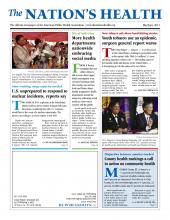More than a dozen years ago, the Department of Justice began a landmark racketeering case against the tobacco industry. The case, which stretched more than six years, led to new restrictions on tobacco marketing and statements of health risks.
Now, with details never before revealed, a new APHA book provides an insider’s look at the department’s Racketeer Influenced and Corrupt Organizations, or RICO, Act lawsuit against the tobacco industry. Written by Sharon Eubanks, JD, and Stanton Glantz, PhD, “Bad Acts: The Racketeering Case Against the Tobacco Industry,” tells how the historic case developed, how the lawyers put the case together, how the tobacco industry’s allies in Congress tried to stop the case and how the Justice Department ultimately prevailed.

“This book illustrates the realities of bringing the largest public health case against a major industry, that ended with the major tobacco companies being identified as racketeers and placed under ongoing oversight by a federal court,” Glantz, an APHA member, told The Nation’s Health. “It shows people what it really takes to bring a major public health enemy to justice and how powers outside the justice system can influence what happens in court.”
A professor of medicine at the University of California in San Francisco, Glantz is a longtime anti-smoking crusader and prolific researcher on the topic. The tobacco industry has twice unsuccessfully sued the University of California in an attempt to stop his work.
To be released in May by APHA Press, the book tells the story of what was happening behind the scenes at the Department of Justice “when Bush Administration officials took aggressive actions harmful to their own trial team’s presentation at trial, in order to protect big tobacco,” Eubanks said.
A private practice attorney in Washington, D.C., Eubanks spent 22 years as an attorney in the Justice Department’s Civil Division, where she led the team that for six years pursued the case against the major cigarette manufacturers for violating the racketeering act.
“The book also addresses what was lost along the way — things like trust and adherence to the rule of law,” said Eubanks, noting that the book, at its core, is about the dedicated team of 40 or so career professionals at the Department of Justice who were able to defeat the hundreds of tobacco industry lawyers.
“I did not want the story of this case to get lost, or worse, to be retold with revisionist historical perspectives,” Eubanks told The Nation’s Health. “The book is important because it shines a light on what can happen when those responsible for following the rule of law fail to apply the rule of law. It is a reminder that we, as citizens, have an obligation to pay attention to our government and examine critically what is taking place.”
For more information, visit www.aphabookstore.org or email apha{at}pbd.com.
- Copyright The Nation’s Health, American Public Health Association









